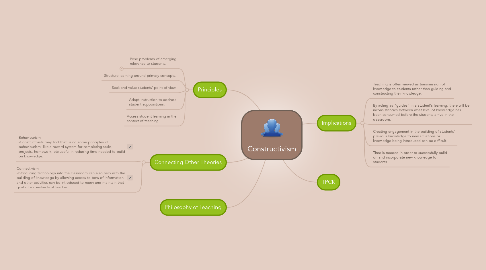Constructivism
by Violet Wallace


1. Implications
1.1. Teaching is often viewed as transmission of knowledge to students rather than guiding and constructing their knowledge.
1.2. By acting as "guides" in a student's learning, there will be inconsistencies between what level of knowledge has been consumed before the students arrive in the classroom.
1.3. Creating engagement in the building of students' previous knowledge to new situations or knowledge being introduced can be difficult.
1.4. Time is needed in order to successfully build on and incorporate new knowledge for students.
2. Principles
2.1. Pose problems of emerging relevance to students.
2.1.1. Sub Idea 1
2.1.2. Sub Idea 2
